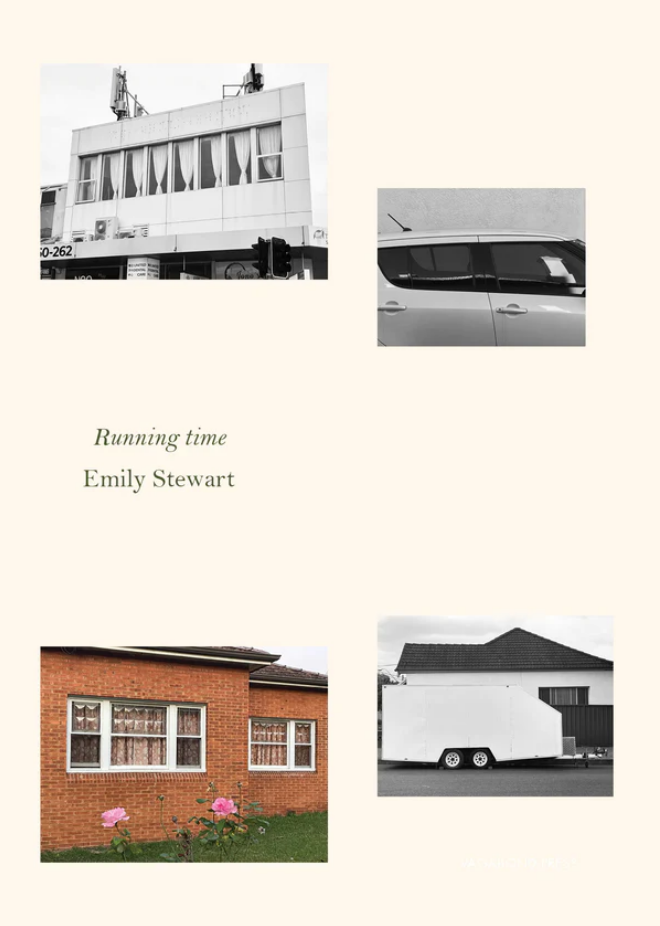 Running time by Emily Stewart
Running time by Emily Stewart
Vagabond Press, 2022
Emily Stewart is the author of numerous chapbooks, including Like and The Internet Blue. Her debut poetry collection Knocks (Vagabond Press 2016) won the inaugural Noel Rowe Poetry Award and reflected an assuredly varied approach as it experimented with multiple voices (not just in monologues but polyphonic within poems), erasure as a feminist poetics (with homage-like condensations of Lydia Davis, Helen Garner, Susan Sontag, Clarice Lispector and more), post-digital affect (extracting poetic value from online idioms in particular, though sometimes overwhelming the poetic value), all while interleaving themes of climate change, the cost of living, and more in an exploration of what it means and feels like to live in so-called Australia in the Anthropocene.
Stewart’s latest book Running time (which won the Helen Anne Bell Poetry Bequest Award for a manuscript by an Australian woman poet) offers a shorter, more localised, more focused, though no less polyphonic, series of poems about her recent time (since the pandemic) living around Ashfield in Sydney’s inner west on unceded Wangal land. And while the poems aren’t about the pandemic, they were generated in the compressed time of 2021’s lockdown. Stewart wrote a piece every day over a couple of months, which gives the book its shape and iterative style.
Each page of the book contains an untitled poem (or fragment), from as little as three lines and up to nineteen lines, the majority falling somewhere in between, like purposefully incomplete or sketched, half sonnets. These fragments are grouped into four sections across the book, titled: ‘So contemporary and so likeable’; ‘Loafing’; ‘Facing the wall’; and ‘Silence is okay’; all of which are quotes from within the poems.
Running time’s syntax refuses conventional poetic devices (like musty metaphor, misty description, high diction, traditional stanzas, heartfelt elegy, starry-eyed ode, precious personification), basic devices that, let’s be honest, are having their heyday again, and that usually perform a guaranteed intensity, the way any genre trope (yes, poetry uses genre tropes too) sets you up to feel things you know you’re going to feel. Stewart makes fun of how plain ‘balsa balsa balsa balsa balsa balsa balsa balsa / balsa balsa balsa balsa balsa balsa wood’ can be because her poetry is developing its own idiosyncratic tropes while taking a stand against the staid, the emotionally manipulative, and the plain boring. And because poems are interstitial – they’re made everywhere, or anywhere, in between everything else (and whenever) – and should be inherently surprising, which Stewart’s invariably are at every turn. The syntax creates the illusion that Stewart is walking or running alongside herself, gathering and noting ‘signs’ as she goes along and then drops them into poems. The poems seem to know just when to drop a subject too; or rather they move swiftly between thoughts, ideas; or perhaps they are the movement of thought. In any event (and there are plenty hinted at, though the focus is more on how feeling and thought can conjure or be conjured by/into language), the poems move languidly from one piece to another, and are sometimes just left hanging, which is not an easy technique to get your heart around, especially if you need poems to end on epiphanies. The syntax might be critiqued as loose, emotional, but I think they feel released. Another technique that unshackles the poems is their eschewing of punctuation. These are the only marks that appear in the four sequences across the book: one comma, one asterisk, two slashes, three ellipses, four dashes, four hyphens and four question marks.
But what are these sequences of untitled fragments, accrued over time, all about? The Helen Anne Bell Award judges write, of Running time: ‘Amid doubt, shame, need and fear, there is courage and insouciance, the subtle pleasure of stretching meaning into a variety of imaginative spaces that open up the limits of conventional language and syntax.’ So, in these poems, what they’re about is entwined in what they’re doing – and Stewart has metapoetic stuff to say about that to boot:
‘I tend towards listing / showy concepts’
‘I can say a lot about the opposite side of things / the alluring challenge / of the unprocessed event’
‘I bring home epoxy filler / truncate an atmosphere’
‘what I’m giving off / is a feeling not a lecture’
[and] ‘of course the details matter’
Here are some random details that might matter:
‘Toyota Echo (intrusive image)’
‘the real work wives of publishing’
‘am I not the gender you asked for’
‘the brain’s rewards centre’
‘I’ll find a job tomorrow / afternoon’
‘dolphin coffee table’
‘dislodged brick / wraparound sunglasses / a toddler’s sock’
‘the building called Oceanic out near Mascot’
In the opening fragment, we find the biggest clue to Stewart’s mode (or mood): ‘at the new pool / I dive into my cerebral offcuts’.
From there, each fragment of offcuts is ‘pushing forward / conceding another day’, at times ‘trying to galaxy brain it’, at other times ‘giving some control back’. There’s a tension between Frank O’Hara-the-art-poet-guru’s manifesto of ‘go on your nerve’ and Stéphane Mallarmé-the-French-aesthete’s doctrine of ‘ceding the initiative to words’.









